Cross-posted at Family Inequality.
Buy a McDonald’s Happy Meal and get a toy: OK, I didn’t expect it to be enlightening.
But to hear Kevin Newell, the company’s executive vice president and global chief brand officer, tell it, that’s exactly what it should be:
McDonald’s is committed to playing a positive role in children’s well-being. The Smurfs Happy Meal program delivers great quality food choices, fun toys and engaging digital content that reinforces important environmental messages.
Awesome. Granted, the last time I saw a Smurf, it was about 1978, and he looked like this:
And I don’t recall being overly concerned with gendered toy representations at the time. Anyway, now I’m told by the Happy Meal box that, “Smurfs are named after their individual talents: there’s Farmer, Painter and Baker… Know your talent and find your Smurf name!”
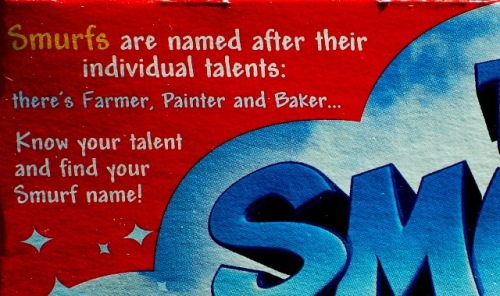 The girls both got male Smurf characters, which struck me as interesting, because the counter person had asked us if the Meals were for boys or girls. Then I looked at the characters on the box. Then I looked at the complete list of them on the website (see the poster version here):
The girls both got male Smurf characters, which struck me as interesting, because the counter person had asked us if the Meals were for boys or girls. Then I looked at the characters on the box. Then I looked at the complete list of them on the website (see the poster version here):
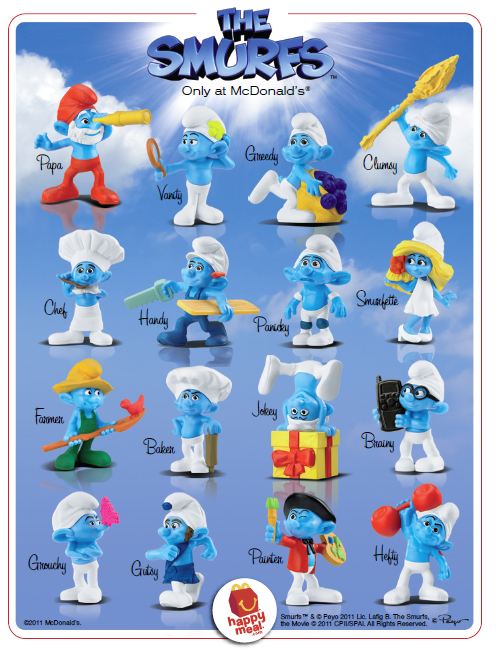 Then I wondered what Smurfette’s “individual talent” was that got her — the only female Smurf – named “Smurfette.” And at that point, if it hadn’t been for all the fat and salt and sugar in my meal, I might have stopped enjoying it.
Then I wondered what Smurfette’s “individual talent” was that got her — the only female Smurf – named “Smurfette.” And at that point, if it hadn’t been for all the fat and salt and sugar in my meal, I might have stopped enjoying it.
In context
I’ve commented before on the gender segregation in film making. The gist of it is apparent in this graph from the Celluloid Ceiling report by the Center for the Study of Women in Television and Film. Not many women in charge:
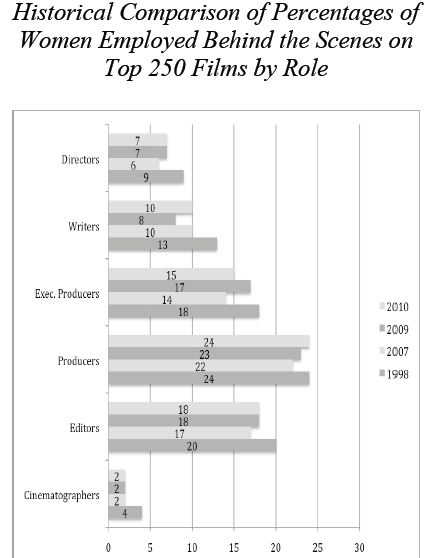 But isn’t it improbable that a blockbuster kids’ movie, which grossed more than $75 million in its first two weeks, could be so blatantly sexist? There are a few women in the cast of the movie version of The Smurfs, but all the Smurfs are still male except Smurfette. Next thing you know they’re going to turn the only female character in this promotion — which, remember, plays a “positive role in children’s well-being” — into an adult sex symbol played by Katy Perry. You’re kidding.
But isn’t it improbable that a blockbuster kids’ movie, which grossed more than $75 million in its first two weeks, could be so blatantly sexist? There are a few women in the cast of the movie version of The Smurfs, but all the Smurfs are still male except Smurfette. Next thing you know they’re going to turn the only female character in this promotion — which, remember, plays a “positive role in children’s well-being” — into an adult sex symbol played by Katy Perry. You’re kidding.
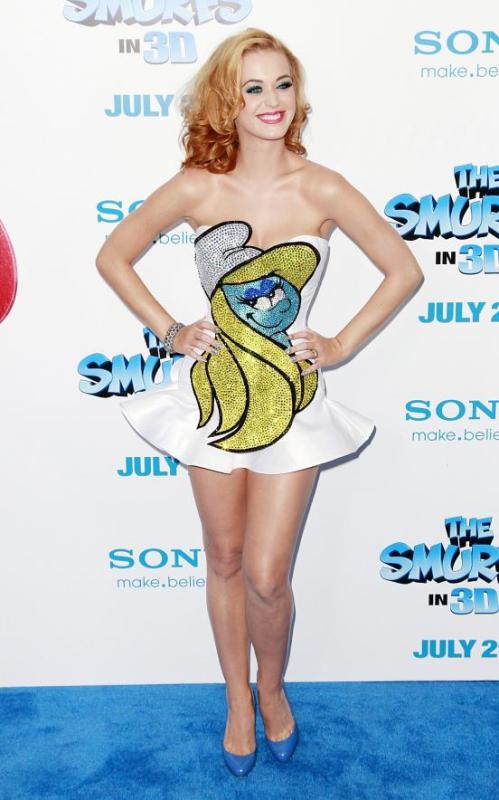 Is sexist even a word anymore?
Is sexist even a word anymore?
In fact, sexism used to be a very common word. According to the Google Ngrams database of millions of terms from their vast collection of digitized books in American English, “sexism” was even more common than “bacon” during the 1990s (you can play with this yourself here):
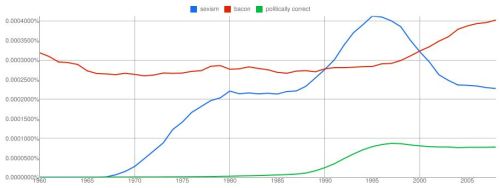 Unfortunately, in my opinion, sexism has retreated from the language, and kids’ stuff seems to be more shamelessly gendered than ever. I think this sad state of affairs is at least partly the result of what you see in that green line above — the backlash against feminism (and anti-racism) that made it seem more unpleasant or unwarranted to make a “big deal” out of sexism than to treat girls like this.
Unfortunately, in my opinion, sexism has retreated from the language, and kids’ stuff seems to be more shamelessly gendered than ever. I think this sad state of affairs is at least partly the result of what you see in that green line above — the backlash against feminism (and anti-racism) that made it seem more unpleasant or unwarranted to make a “big deal” out of sexism than to treat girls like this.
P.S. I haven’t seen the movie. Please tell me it has a hidden feminist message I haven’t heard about.

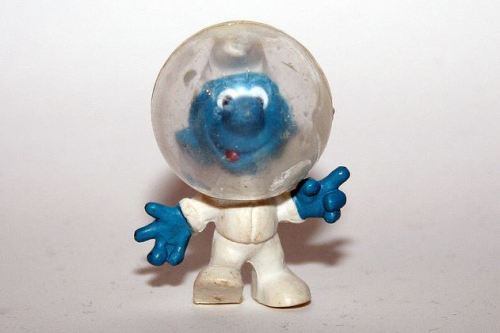
Comments 63
Steve Pan — August 11, 2011
Obviously no sexism going on here! Herp derp
Tommy Lassoo — August 11, 2011
I've been thinking the same thing, every time the London bus with The Smurfs' poster on it goes by I bristle a little bit. There they are, all the innocent blue creatures - all male, apart from one girl, one lovely, blonde, preening girl. Big fat yawn. Bridesmaids helped highlight the issues about women being basically invisible in Hollywood but it's still one big joke. The answer, as far as I see it, is to use the means we have to make our own stuff. It's cheaper and easier than before. I don't mean Hollywood movies but short films can be made for nothing and put on the internet, anyone can write, draw. Do whatever you can, just make sure that somewhere there's an alternative.
Fred Serval — August 11, 2011
Seriously, I understand all your concerns about sexism, but you obviously have a lack of knowledge concerning the Smurfs' mythology.
First of all their species is asexual, in fact Smurfette was created by Gargamel. And if you read the comics, I'm pretty sure that you will be a bit more compelled by the ploitical (smurfs' organisation) and anti-semitic content (representation of Gargamel).
Anyway, I don't think that you could consider "clumsy" or "greedy" as an individual talent.
The blog is great though.
Lynn De Pourcq — August 11, 2011
Smurfette isn't the only female smurf.
lupalz — August 11, 2011
I am afraid there is not going to be a hidden feminist message in the movie ;)
Most movie maker are too afraid and/or incapable of coming up with anything new so they stick to the original material, which is based on creatures that they have no sex but have a gender (all males but one). It is a shame because I used to watch the TV series and loved it. There was some good stuff to pick up and make something cool out of. It's a missed opportunity, or as the kids nowadays would say a #smurfail
Rosario Pires — August 11, 2011
Cf. Tropes vs. Women: #3 The Smurfette Principle http://www.youtube.com/watch?v=opM3T2__lZA
Jess Raven Gordon — August 11, 2011
I haven't seen it. But I loooooved the cartoon when I was a little girl and I still grew up to be a feminist. So that's comforting.
Sarahlane1 — August 11, 2011
I saw it with my son and daughter. The only other female besides Smurfette was the pregnant human wife of Neil Patrick Harris (which was ironic in and of itself) played by the doe-eyed school counselor from Glee. She was demurely vulnerable and nurturing through out the movie. Her main occupation seemed to be painting flowers on furniture. I'd say the message was blatantly anti-feminist.
Ms. Sunlight — August 11, 2011
It's sad that the Smurfs continues to stay so close to its 1950s sexist roots. The introduction of a "little sister" called Sassette for Smurfette does not bring things up to date.
People who are saying that Smurfs are asexual are missing the point. The point is, far too often fiction media genders asexual things by putting cultural markers on them and through our choice of voice actors. We gender robots, we gender fictional aliens, we gender computers and yes we gender Smurfs. Overwhelmingly, ungendered is portrayed as male. Male is default, female other.
The plain fact is, we can do better than that, some shows have done better than that and I think it's still important that we notice and challenge the messages that this unnecessary gendering sends.
Emilie — August 11, 2011
Great Ms. article about the Smurfs:
http://msmagazine.com/blog/blog/2011/08/01/smurf-girls-are-easy-and-love-to-shop/
Anonymous — August 11, 2011
On a side note, I've noticed that if you search Google with the word "sexism" it magically turns into the word "sexy". Says a lot about what the backlash brings with it.
WG — August 11, 2011
A lot of the argument here seems to be that Smurfette is the only female, or at least feminine smurf and that is somehow wrong. Several assumptions are made that I question.
-If an argument is based on the archaic notion that long hair and dress equal feminine, then yes, Smurfette is the only one of that type, apparently.
-If we apply the same archaic, diametrically opposed notions of male or masculine, it is clear that only Papa Smurf is the only masculine gendered smurf, due to his beard (although beards and facial hair is not confined to males...).
-That said, both masculine and feminine genders are represented equally and the rest, lacking in gendered stereotypes, are gender neutral.
-Voices... many cartoon masculine and male characters are voiced by females (i.e. Bart Simpson, etc.). I am unsure as to how sex or gender can be accurately determined by voice alone, or why people have a need to determine gender at all for that matter.
-Sex... I see no, nor do I desire to, genitalia. Sex is impossible to accurately determine otherwise. Even with the presense of genitalia, sex may be indeterminable.
-Power... IF Smurfette was the only feminine character, the only issue I could see is that if her efforts, position, activities, etc. were seen as less valued then her Smurf counterparts. Is this the case?
-By saying that Smurfette is the only female Smurf, as evidenced by hair and dress, isn't that also implying that females are only to wear dresses and have long hair and that is the only way to determine a female or not? I see that as a much bigger infraction. Females come in all types, just as males do. To confine your interpretation of gender expectations to strict tertiary characteristics would, IMO, be a failure of diversity.
Anonymous — August 11, 2011
Smurfette has always seemed to be a sex symbol with relatively adult implications, honestly; her being played by Katy Perry doesn't change this (in fact, this idea that "anything related to Katy Perry=filthy sex corrupting our children" is annoying). Smurfette and the Smurfs in general have ALWAYS been sexist, and I doubt the movie changes any of that. TBH, if the only female character (aside from the two that no one remembers, Sassette and Granny) was created to be a force of evil, and had to be changed, because there is no use for females, period, in an all male society, that's going to have sexist implications no matter how you spin it. Commercialize it and have Katy Perry voice it all you want, it's always been pretty sexist as a concept.
And "sexism has retreated from the language?" I'm sorry, but your gender is clearly influencing your perception of modern society and sexism. I grew up female in the 90s....it's not that sexism was more widely acknowledged as an actual concept. It's that sexism and racism were generally taught as "past mistakes" that people needed to be educated about as history. It was a big time for the whole idea of "aren't we just so much more enlightened than our parents," but it was not any less sexist. And there have ALWAYS been backlash against feminism and anti-racism. The Smurfs is certainly not evidence that this backlash is new or trendy. It's been around since those ideas were formed, and they're not going away soon.
Del4yo — August 12, 2011
There's an element you don't know. The Smurf are much older than you think, early sixties I think. By the time of their creation in Europe , it was forbidden BY LAW to put female cartoons in children's magazine. The law was abrogated only in the seventies. It's even more sexist than you think. Worse of all, the smurfette was introduced later as a creation of a sorcerer, to imbalance the male fraternity of the smurfs. I don't understand why they continue this series, when it should have been forgotten a long time ago.
Ingrid — August 12, 2011
It is an interesting pint of view. As far as I remember from the TV series I watched in my childhood, Smurfette was created by Gargamel as a kind of the Troian horse. She was to help him get to the Smurfs. She was then a black haired, not at all handsome and rather filthy character. Her looks changed when - I don't remember how - Papa Smurf convrted her into a real Smurf. Then she got her blond hair and high heels, turning into a real sex symbol. That's what I call sexist. The whole story is about manipulating women, turning them into what men want them to be and that it is good when men want them to be smaller versions of Marylin Monroe.
Amy Reads — August 14, 2011
Yes, being a girl is so special isn't it, we get one whole smurf :P And speaking of things being shamelessly gendered... how about how McDonalds always asks if you want a boy or a girl toy. Because, you know, boys and girls OBVIOUSLY need different toys, right? Ugh.
On the table, 8/16 | Cultural Granola — August 16, 2011
[...] Smurfette and the Decline of “Sexism” in the English Language by Philip Cohen at Sociological Images [...]
Saffi — August 16, 2011
For me, the biggest problem is illustrated by the fact that name of the only female Smurf is "Smurfette." By the naming convention of the Smurfs, this means that being female is a characteristic - i.e., some external trait put on to the generic model of a Smurf and changed it to differentiate it from other Smurfs.
In other words, "normal" = "male."
It is bad enough the writers of that too many other books, films, and television shows unconsciously build plots around the assumption that the default setting of a person is male. But the writers behind the Smurfs openly embrace this notion without any recognition of its inherent sexism, which is why I find the Smurfs objectionable.
I've read some the strained arguments to the contrary (for example: Smurfs are supposedly asexual, it's the fault of obsolete European standards, she's a nice person, etc.). But the fact remains that little kids see a group for which "male" = "normal" and having a single female is considered somehow balanced. This is a concept that shouldn't be reinforced, no matter how much money the studio is going to make.
Yannick — August 17, 2011
You might want to know, there's a special reason there's a single female smurfette - the smurfs are normally asexual (though that's implied to be male, I guess). The lone female" smurf was artificially created.
I guess Peyo should have known better, in the 60's, then to do this in the fear that some kind of feminist message could be construed from it 50 years later.
Ducky — August 25, 2011
I have noticed no one picking up on this. Because they are focusing on Smurfette so let's look at it like this. What if Gargamel didn't like those "gay" cute blue phallic symbols of manhood! He was threaten by the thoughts that made him feel Good about what society called bad! A society of all men happy and content with themselves! So he created Smurfette to start problems making them question their "man love"
So maybe this isn't about sexism but more about anti-gay?
Also we can think of smurfs as not talents but as expressions of behavior not just job types but the arch-types those jobs have. As greedy and lazy are behaviors not jobs.
and what if Smurfette was not a "girl" but a "Trap" as they are called in some circles or in drag!
Фиксики против смурфиков? — November 14, 2022
Добрый день! А можно написать сказку про фиксиков? Нужно её написать на компьютере? Фиксики против смурфиков? Хорошо. Спасибо за цену! А лоне Смурф? Тоже? Цена? Спасибо за сказку Фиксики против смурфиков!
Anonymous — November 14, 2022
Вы же могли забыть ещё и про алычу? Алычу такая желтая слива, где есть косточки? Хорошо. А какие ещё книжки про фиксиков есть? Разные? Хорошо. Фиксики: Другой серкет? Спасибо за книжку Фиксики: Другой серкет!
Фиксики: Безумный секрет? — November 14, 2022
Я хочу книгу Фиксики: Безумный секрет. Две книжки про фиксиков. Или три? Три. Хорошо. Цена за 8 рублей? Ладно. Спасибо за книжки Фиксики: Безумный секрет, Возращение Файерверка и Фиксики против Стогая!
Фиксики: Большой серкет — November 14, 2022
Стогай, у нового фиксика по имени Стогая есть волосы смурфика и кожа кокоса-миндаля покрыта. Я такой мультик посмотрела.
Файерверк Красно-голубой и сине-фиолетовый. Файерверк всё ломает а не чинит. А также летает по проводам
Пружинка У Пружинки кожа малиновая. У неё есть розовая одежда и конечно волосы в виде сердца
Как надо писать правильно? — November 14, 2022
Опять книжку про фиксиков? Нет. Хватит. Давай лучше поговорим Анюта и Верочка. Слушайте. Вы мне дали 5 книжек про фиксиков. Но я с своей плюшевой Смурфлили пишу на фотографиях и на видео. Я люблю! Ладно. Пока, Анюта и Верочка. Я сегодня не хочу с светом. Я хочу только играть с Файерверком. Он же фиксик! Pace.
Фиксики против кработов — November 14, 2022
Симка
Нолик
Дедус
Файер
Игрек
Шпуля
Верта
Катя
Димдимыч
Професор Чудаков
Альт
Мега
Эрика
Лизонька
Ноль Восемь
Фиксики: Спорт — November 14, 2022
Лиза вдруг заметила своего Тимофея. Тимка убежал. Сколько Тимофей раскидал! Я начинаю убирать комнату. Детскую? Ладно. Теперь за работу. Я не начала убирать игрушки. Ладно. Вы знали про мою уборку? Конечно знали! Убираем! Всё убрала все игрушки. Уборка закончилась! Pace.
Кушать надо только еду! — November 14, 2022
Тимка переключает! Он смотрит мультики. 1! 2! 3! 4! 5! Мы не одни. Не стань разнодушным! Ах-ха-ха-ха! Как смешно! Смурфафиксик. Не упади с вершины! Детские шаги опечатки лап. Аудио-загадки это круто! Я люблю кушать э... ...сахарную воду! Е... Воды надо добавить. Я низачто не смогла убрать сюрпризы. Pace.